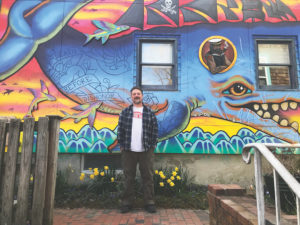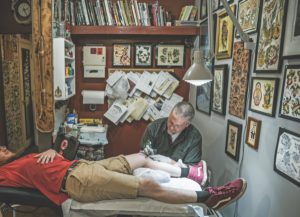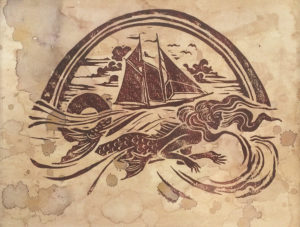
In 2009, Kris Smith launched two brave new ventures in Provincetown. One was Coastline Tattoo, his tattoo studio, at 290A Commercial St., at the end of the Bob Gasoi Memorial Art Alley. The other was Helltown Workshop, an art gallery on the second floor of Whaler’s Wharf, where Smith and four local artist friends — Ethan Manach, Andrew Jacob, Joey Mars, and Matt Millett — set up an exhibition space for young homegrown talent.
“We had all been artists on the Cape for years, but none of us had a place where we could show our work, because it was not your typical Provincetown art,” Smith says. “It was more street art, with a different kind of vibe than most of what is shown in town. There are great galleries in town, but we were geared toward the younger, alternative crowd. We were trying to tap into the energy of local undiscovered artists.”

Fast forward to 2020: Smith’s Coastline Tattoo has become well established among tattoo lovers, with customers from all over the world. “Coastline,” he says, “was born to be a laid-back tattoo shop, with an emphasis on working with clients’ own ideas to create custom tattoo designs. We’ve had many talented artists do guest spots, but the constants are me, Alice White, and Ephy Kurucz.”
When it comes to creating tattoo art for his clients, Smith says that what matters most is listening to the emotions they bring into the studio. “There are many nuances involved in a tattoo, from getting the design right to reading the person in front of you,” he says. “I always try to give the person what they came in imagining. I’m not trying to impose my ego on their decision. Tattoos are a very individual form of expression.”
As for Helltown Workshop, it gave up its Whaler’s Wharf gallery in 2012, but lives on in once-yearly (or more) pop-up exhibits and artist collaborations. “When we started Helltown,” Smith says, “we were there at the right time, right place, and we ran with it. But it was a labor of love. We never made any money. We all pitched in to keep the place open for four years or so.”

Smith says he has always been “drawn to comic books, graphic novels, street art, album covers — outsider art.” His focus shifted to tattoos in the early 1990s, when he moved to Provincetown. “I bought my own equipment with the money I made washing dishes in the summer,” he says. “I tattooed my friends, and it progressed from there. In 1996, I bought a one-way ticket to Europe, and ended up in Prague, in the Czech Republic. I rented a place with 13 others, one of whom was a tattoo apprentice who got me a job at a tattoo shop off Old Town Square.”
In 1999, Smith moved to New Orleans, where he worked as a tattoo artist at Jacci Gresham’s Aart Accent, outside the French Quarter. Smith’s path as a tattoo artist is indicative of the itinerant, international nature of the tattoo world, which is what makes it so vulnerable to the pandemic.
“We temporarily closed Coastline on March 15 to protect our shop, clients, and community,” Smith says. “This is a huge blow, going from having multiple appointments and walk-ins to zero income, with all the bills and responsibilities to maintain. We are coming into our busy season in Provincetown, and to have a global pandemic hit, just when we were expecting to start seeing more international clients come in, is a concern.”
While Coastline Tattoo is closed, Smith is working on artwork for Helltown Workshop’s shows at Julie Heller Gallery East (scheduled for July 24-Aug. 2) and Julie Heller Gallery at the beach (Nov. 13-22). As part of Provincetown 400, the Heller galleries are gearing up “to run a retrospective of Provincetown art, from the traditional all the way to Helltown,” Smith says. “We’re going to be at the tail end, to wrap up the program.”
Smith hopes that the art he’s creating reflects what’s happening during the current crisis. “The pieces I was working on three weeks ago, I may even scrap,” he says. “I look at them and think, what’s the point of that? There are much more important things going on now. Content-wise, it feels important to be able to address those new concerns.”
And the concerns are many. “My son’s school is closed, so my wife and I are now home-schooling a six-year-old,” Smith says. “I am glad to have this time to spend with my family. I think the circumstances will force people to look at what is important and create healthier relationships with those around them. I have spent much time over the past few years being a steward of the land, practicing natural farming, planting a sustainable garden for food and medicine, reconnecting with the earth. I feel people have lost touch with nature, in our overstimulated, instant-gratification, technological society.”
In preparation for reopening Coastline, Smith is intent on making the studio environment as safe as possible. “We are well trained as tattoo artists in dealing with sterile procedures, keeping the shop clean, and the prevention of cross-contamination,” he says. “And we are now exploring extra-precautionary procedures to make sure our artists and clients remain safe and healthy. Tattoos have been a part of people’s history since the beginning of time. I believe that people will continue to get tattoos. People express themselves through tattoos for many different reasons, and one of those is celebrating overcoming hardship.”
